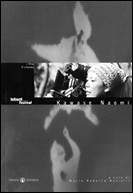Kawase Naomi: I film, il cinema
by Tom Mes
The film book culture in Italy is unlike any other in scope and dedication. No subject so obscure or it will have a thorough study devoted to it. Looking for a book on the complete films of Tobe Hooper? Head for Rome, young man.
Japanese cinema has obviously not been left out, thanks largely to the efforts of Maria Roberta Novielli, who teaches Japanese film at the university of Venice and has authored and edited several excellent books, including Storia del cinema giapponese. She also lorded over this (Italian language only) overview of the complete work of Nara's idiosyncratic mistress of the 8mm ego-document, Naomi Kawase.
Kawase's audience is a deeply divided one. Since the Camera d'Or for her debut feature Suzaku (Moe no Suzaku) in 1997, reactions to her work have run the gamut from praise to complete rejection. In France and Italy she is revered as a great artist and both countries have hosted complete retrospectives of her work, but at home her highly intimate form of cinema finds little support.
This fine little volume was published to coincide with the first-ever Naomi Kawase retrospective, at the congenial Infinity Festival, in Alba, Northern Italy, in 2002. Rather than an out-and-out monograph, it presents a selection of insightful essays by the likes of Infinity director Luciano Barisone, Aaron Gerow, Inuhiko Yomota, and editor Novielli, fragments from Kawase's diary and the novelisations of her films Suzaku and Hotaru, an interview with Kawase by Novielli and Barisone, a biography, and finally a very exhaustive overview of the director's work, including the little-seen 8mm experiments Kawase made in her late teens and early twenties.
There is little to fail here. The essays live up to the reputations of their authors and present Kawase as a versatile artist with a rare sensitivity to her surroundings, both natural and familial. The generous sampling from Kawase's own writings is entirely logical given the personal nature of the filmmaker's work, while the overview of her filmography uses quotes from a variety of sources to present a diversity of viewpoints (including, again, Kawase's own). But given the homogeny of her work, it's no surprise that the opinions expressed in most of these tend to be on the harmonious side.
If Naomi Kawase's own work tends to divide, there is no such danger with this 128-page volume. Kawase Naomi: I film, il cinema is much like its subject: sober and modest, but very impassioned.
